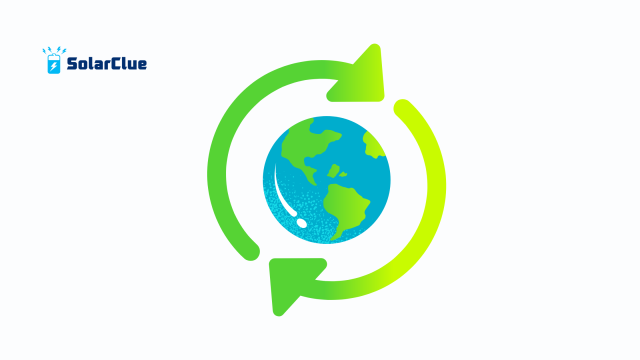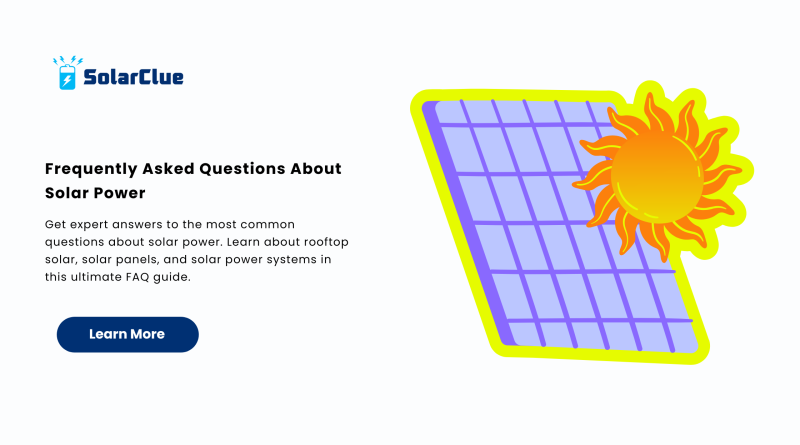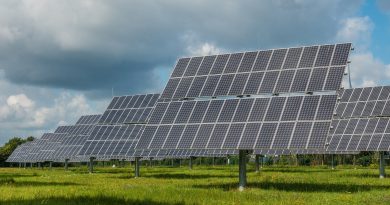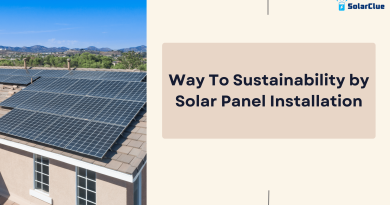Frequently Asked Questions About Solar Power
As the world shifts toward cleaner and more sustainable energy solutions, solar power has emerged as one of the most promising alternatives. From reducing electricity bills to promoting environmental responsibility, adopting solar energy offers a wide range of benefits for homeowners and businesses alike. However, with this growing interest comes a flood of questions. In this comprehensive guide, we address the most Frequently Asked Questions About Solar Power to help you make informed decisions, whether you’re just curious or seriously considering making the switch to rooftop solar and a complete solar power system.
What is Solar Power?
Solar power is the process of converting sunlight into electricity. It uses solar panels, usually installed on rooftops or open areas, to capture sunlight and convert it into usable energy. It’s a renewable, sustainable, and environmentally friendly source of power that significantly reduces electricity bills and dependence on fossil fuels.
Table of Contents
- 1 How Do Solar Panels Work?
- 2 What is a Solar Power System?
- 3 How Much Does a Solar Power System Cost?
- 4 Is My Home Suitable for Rooftop Solar?
- 5 What Are the Benefits of Rooftop Solar?
- 6 How Long Do Solar Panels Last?
- 7 Do Solar Panels Work During Monsoon or Cloudy Days?
- 8 Is Maintenance Required for Solar Panels?
- 9 Can Solar Power Be Used at Night?
- 10 How Much Can I Save Using Solar Power?
- 11 What is Net Metering in Solar Power?
- 12 Are There Government Subsidies for Solar Power in India?
- 13 Is Solar Power Environmentally Friendly?
- 14 How Can I Get Started with Solar Installation?
- 15 FAQs
How Do Solar Panels Work?
Solar panels are made up of photovoltaic (PV) cells that absorb sunlight and convert it into direct current (DC) electricity. This is then passed through an inverter that changes the DC to alternating current (AC), which is suitable for powering appliances and devices in homes and businesses. A complete solar power system includes not just the panels but also inverters, wiring, and optional battery storage to optimize performance.
What is a Solar Power System?
A solar power system consists of several components including solar panels, inverters, wiring, support structures, and batteries (if applicable). The system’s function is to capture sunlight, convert it to electricity, and supply it for immediate use or storage. There are three main types of systems: on-grid, off-grid, and hybrid.
How Much Does a Solar Power System Cost?
The cost of a solar power system varies depending on factors such as system size, brand, efficiency, and installation location. On average, a residential 3kW system in India can cost between INR 1.5 to 2.5 lakhs. However, government subsidies and reduced monthly electricity bills make it a highly cost-effective investment over time.
Is My Home Suitable for Rooftop Solar?
Your home may be suitable for rooftop solar if it receives ample direct sunlight and has sufficient shadow-free space. South-facing rooftops are typically ideal. A site inspection by a certified installer will determine your home’s potential for solar energy production.
What Are the Benefits of Rooftop Solar?
Installing rooftop solar offers numerous benefits:
-
Reduced electricity bills
-
Environmentally friendly energy use
-
Low maintenance requirements
-
Eligibility for government subsidies
-
Increased property value
How Long Do Solar Panels Last?
High-quality solar panels generally have a lifespan of 25 to 30 years. Most manufacturers offer warranties for at least 20 to 25 years, ensuring that your investment remains productive and efficient over the long term.
Do Solar Panels Work During Monsoon or Cloudy Days?
Yes, solar panels do work during cloudy or rainy days, though their efficiency may be reduced. They still generate electricity from diffuse sunlight. Additionally, solar power systems with battery storage can help maintain energy supply during such periods.
Is Maintenance Required for Solar Panels?
Maintenance is minimal and generally limited to cleaning the solar panels every few weeks to remove dust and debris. It’s also a good idea to have an annual professional inspection to ensure all system components are functioning optimally.
Can Solar Power Be Used at Night?
Since solar power is only generated during daylight, usage at night depends on whether your system includes a battery. With batteries or hybrid solar power systems, excess energy produced during the day can be stored and used after sunset.
How Much Can I Save Using Solar Power?

Savings from solar power depend on your energy usage, system size, and local electricity rates. On average, homeowners can save between 50% to 90% on their monthly power bills. Some systems even allow for energy to be sold back to the grid, further increasing savings.
What is Net Metering in Solar Power?
Net metering is a billing arrangement that allows solar power system owners to feed excess electricity into the grid. The energy exported is then credited to the user’s electricity account, reducing future bills or offsetting costs.
Are There Government Subsidies for Solar Power in India?
Yes, the Government of India offers subsidies of up to 40% for rooftop solar installations. These subsidies are available for residential users and are disbursed through local DISCOMs under the MNRE guidelines.
Is Solar Power Environmentally Friendly?
Absolutely. Solar power is one of the cleanest sources of energy available today. It reduces dependence on fossil fuels, lowers greenhouse gas emissions, and has a minimal environmental impact compared to traditional energy sources.
How Can I Get Started with Solar Installation?
To get started, you should contact a reputable solar installation company for a site assessment. They will guide you through choosing the right solar power system, help with permits and documentation, and ensure proper setup. This transition not only lowers your electricity bills but also contributes to a greener planet.
FAQs
Q: What happens during a power cut?
A: Grid-tied solar power systems usually shut down during power outages unless they’re connected to battery backups or hybrid systems.
Q: Will my solar panel work in winter?
A: Yes. As long as there is sunlight, even on cold days, your solar panel will generate electricity.
Q: Can I expand my system later?
A: Yes, most systems are scalable. You can add more solar panels or upgrade inverters based on energy needs.
Q: What is the payback period for solar installations?
A: Typically 3 to 6 years, depending on usage, subsidies, and location.
Q: Do I need government approval for rooftop solar?
A: Yes, especially for net metering. Installers usually help with all necessary approvals and paperwork.
We hope this comprehensive guide on Frequently Asked Questions About Solar Power has answered your queries and helped you understand the immense potential and benefits of going solar. Whether you’re looking to reduce your energy bills or make an eco-conscious decision, switching to solar power is a smart and sustainable choice.
Excited to start your solar journey? Power up your knowledge and take the first step today — visit solarclue.com for expert guidance or explore more insights at blog.solarclue.com. Let the sun save your bills — the future is bright and solar-powered! 🌞



